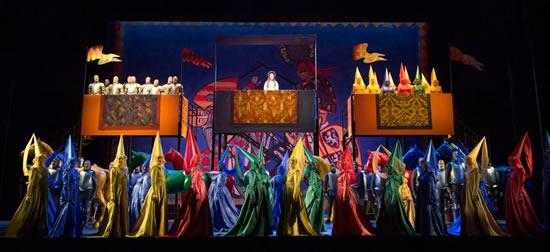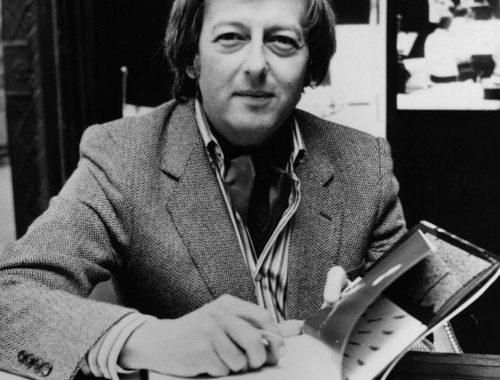Meyerbeer “Robert Le Diable”, Royal Opera House (Review)
 In the fictional museum of operatic history the Meyerbeer exhibit invites curiosity more than it commands respect. One sees his place in the grand – very grand – scheme of things, one can appreciate his influence, acknowledge his success, but hearing a piece like Robert Le Diable (staggeringly the 74th performance at the Royal Opera House, though not since 1890) one seriously questions why? Of course we cannot experience a piece like this with 19th century eyes and ears or indeed an appreciation of the singing styles of the times; and nor we cannot underestimate the appetite of the times for grandiosity and display for its own sake. But even so, after almost 90 minutes of acts one and two (of five), virtually no plot development, and some truly abysmal music I began to wonder if curiosity was a good enough reason to squander Royal Opera House resources on its exhumation.
In the fictional museum of operatic history the Meyerbeer exhibit invites curiosity more than it commands respect. One sees his place in the grand – very grand – scheme of things, one can appreciate his influence, acknowledge his success, but hearing a piece like Robert Le Diable (staggeringly the 74th performance at the Royal Opera House, though not since 1890) one seriously questions why? Of course we cannot experience a piece like this with 19th century eyes and ears or indeed an appreciation of the singing styles of the times; and nor we cannot underestimate the appetite of the times for grandiosity and display for its own sake. But even so, after almost 90 minutes of acts one and two (of five), virtually no plot development, and some truly abysmal music I began to wonder if curiosity was a good enough reason to squander Royal Opera House resources on its exhumation.
Things got better – or at least my musical receptors adjusted. But this curious hybrid of German-Italian opera with distinctly French sensibilities is wildly erratic vacillating between the jaunty and facile, the crudely melodramatic, and the occasionally haunting and innovative. There is an extraordinary a capella trio in act three which seems to break new ground – but where did it come from and where was it going? It seemed to sit like an oasis of inspiration amidst so much aimless hectoring. Another precious moment occurs in the penultimate act – and I can single it out because so little of this piece engages on an emotional level – and that is the moment that Isabelle (the outstanding eleventh hour substitute Patrizia Ciofi) implores Robert (Bryan Hymel) to repent. In an exceptionally beautiful harp and cor anglais (two of them) inflected aria we at last experience why it is we come to the opera. But Meyerbeer’s priorities were different for the Paris of 1831and in the interests of crowd pleasing exceptional technical difficulties were flung at the singers for no good reason other than to excite. Awkward high D-flats for the tenor, bizarrely contortionate elaborations for the sopranos, and a plethora of sepulchral bottom Ds for the bass that more often than not serve cosmetic rather than textual purpose. And then there’s the stage spectacle.
And this is where the man with short straw, director Laurent Pelly, has taken a risky decision. In an attempt to leaven the extravagance and deflate the promposity he risks trivialising the piece with his own very distinctive brand of Gallic parody. It’s Monty Python and the Holy Grail meets Camelot with a touch of surrealist pantomime thrown in for good measure. Toytown sets (Chantal Thomas) and gaudily coloured fairground horses cut the sprawling melodrama down to size, a craggy mountainside became molten with a cheesy animation of hellfire and damnation. You get the picture. And mostly it looked hideous. But short of attempting a full-blown recreation of the bombastic original, what else could Pelly have done, you may well ask? Well, there’s no answer to that except “why do it at all?”
Nothing about the evening felt comfortable. The ROH Orchestra were ill at ease under Daniel Oren, Marina Poplavskaya was all over the place as Alice, a role she should never have sung (and almost withdrew from) demanding as it does the kind of high-flown, fine-spun coloratura that is not her forte. The much-publicised last minute replacement of Jennifer Rowley with Patrizia Ciofi brought some real bel canto style and practised flair (strangely she has it in her repertoire) to the role of Isabelle. Bryan Hymel was pretty impressive in the title role bringing beef and bravery to an occasionally ungrateful sing (though one has to wonder if Meyerbeer had a voice that substantial in mind when he wrote it) and John Relyea’s gaunt presence and voice as the diabolical Bertram laid down a convincing model for collectors of souls to come. He may not have had the best tunes but he certainly had the best notes and plenty of them.
Hopefully one will never have to see Robert Le Diable again and Meyerbeer can happily reside in the pages of musical academia. I will, though, remember with amazement and amusement what was after all the big sensation of the original production – zombie nuns (don’t ask) arising from unconsecrated graves to satisfy their lust on our seemingly helpless hero. So this is what an eternity of abstinence does for you.
You May Also Like

A Conversation With TONY BANKS
02/09/2010
GRAMOPHONE: André Previn – A Tribute
24/04/2019